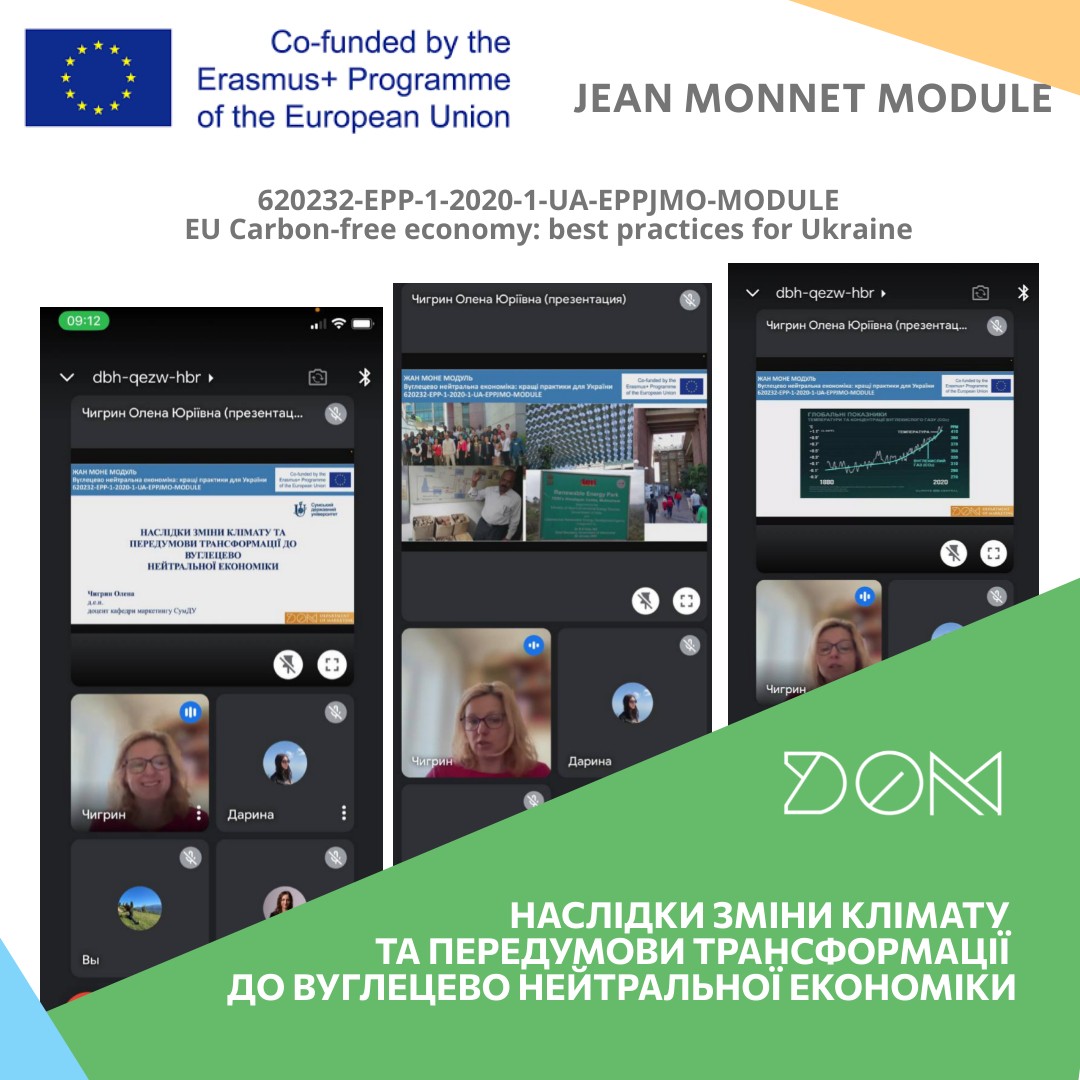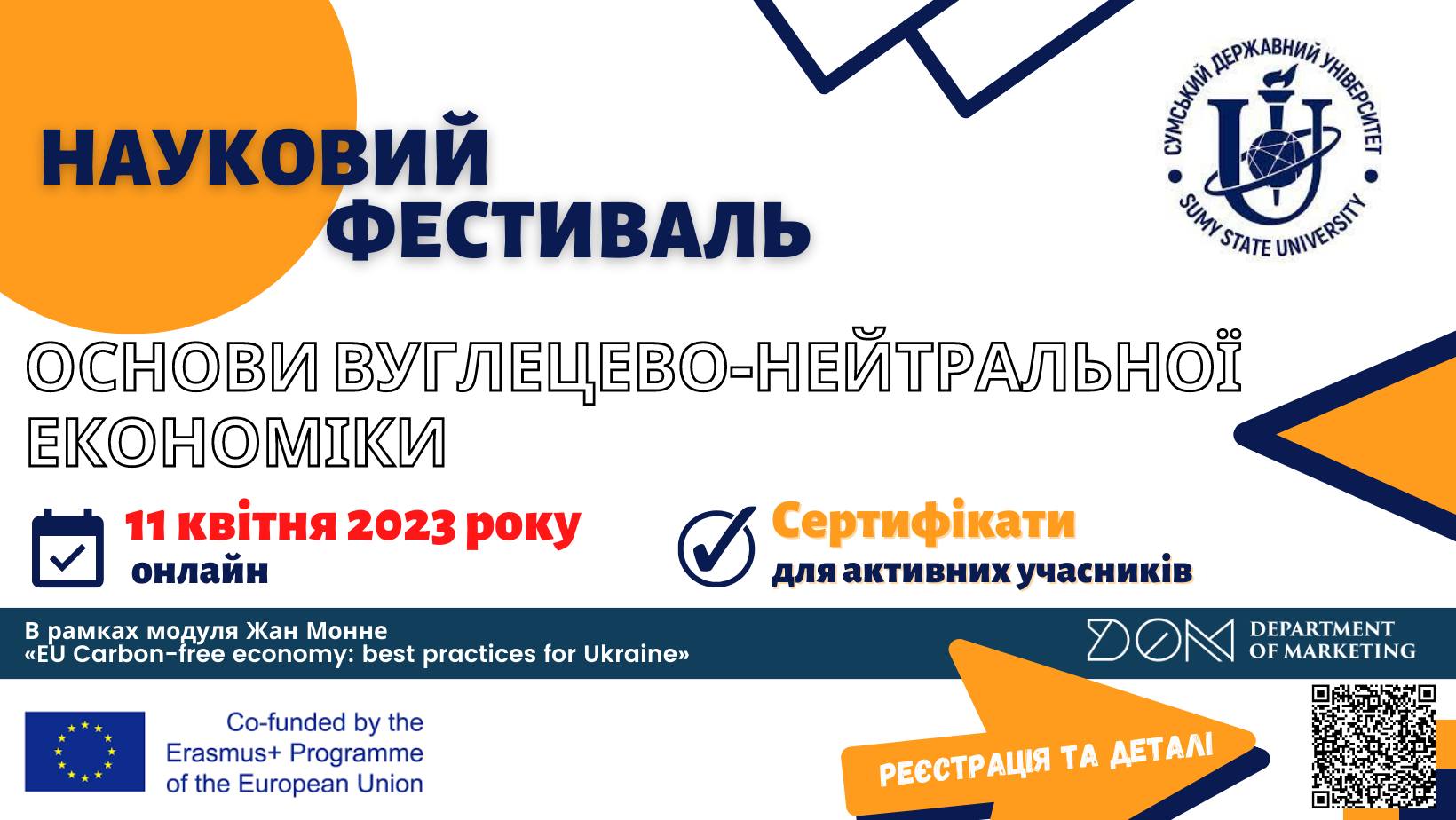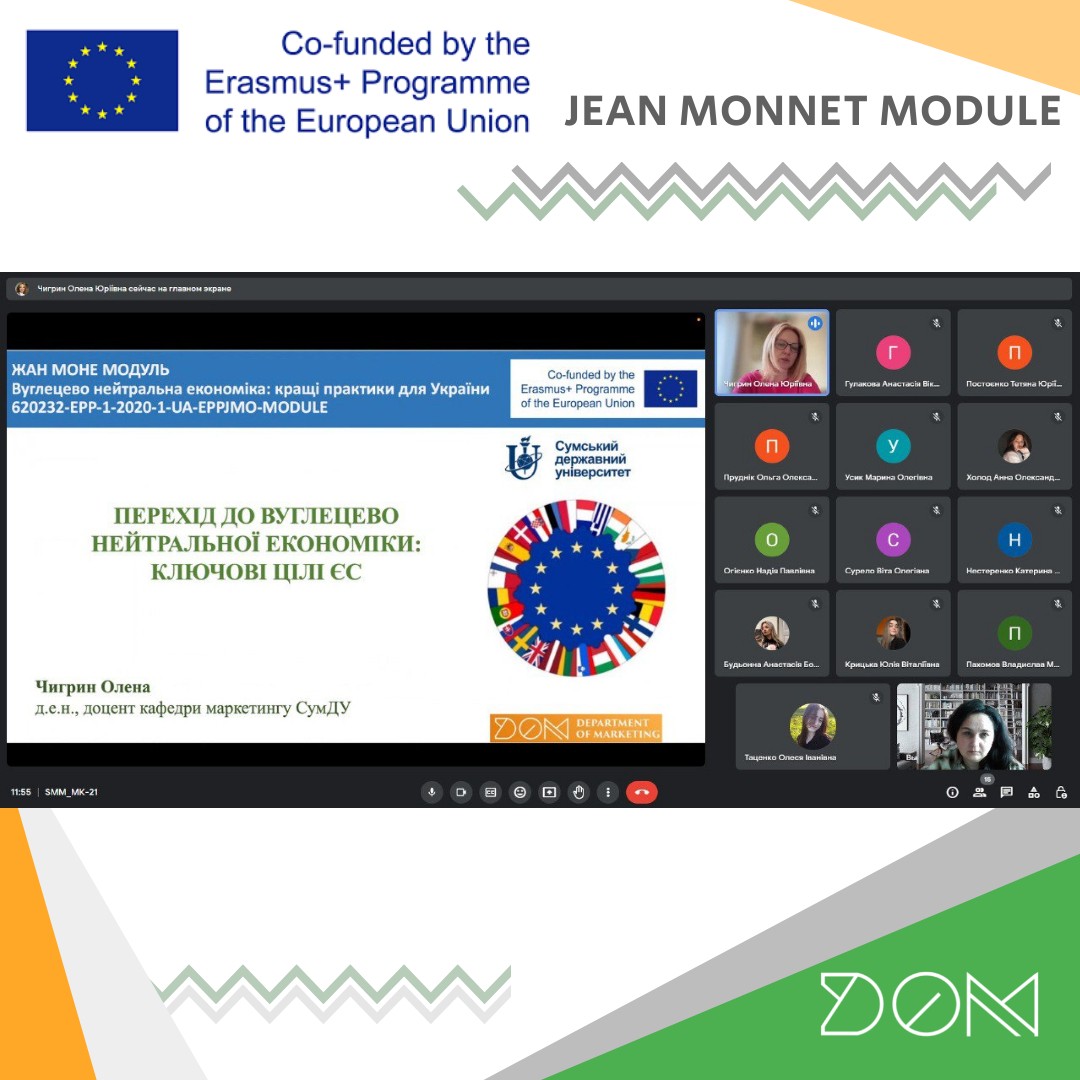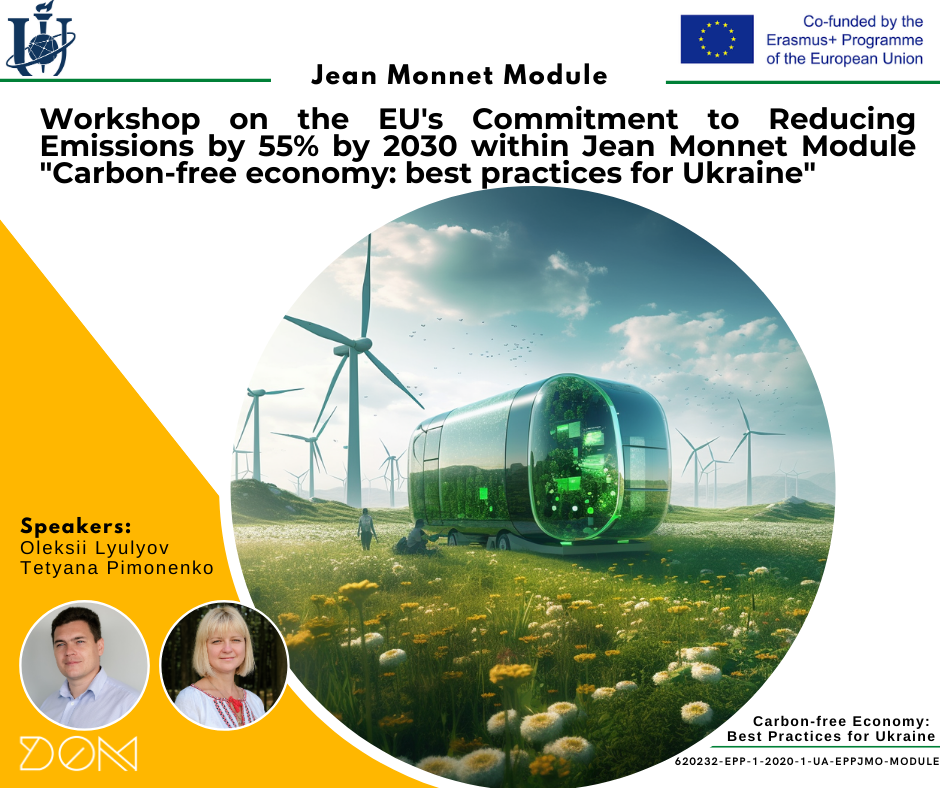News and Materials 2023 year
Effects of climate change and prerequisites for the transformation to a carbon-neutral economy

Students continue to implement Jean Mone project "Carbon-free Economy: best practices for Ukraine" (620232-EPP-1-2020-1-UA-EPPJMO-MODULE). On April 6, 2023, students of the Department of Marketing and the Department of Financial Technologies and Entrepreneurship attended the lecture discussion dedicated to the consequences of climate change and the prerequisites for the transformation to a carbon-free economy (24 BA students). Olena Chygryn spoke about the features of the global climate crisis, the dynamics of growth in indicators of anthropogenic pressure, ways to ensure global climate neutrality, and the implementation of the tasks and provisions of the Paris Climate Agreement. Listeners were interested in the issue of Ukraine's obligations and nationally determined contribution to reducing greenhouse gas emissions by 2023.

- the objectives and basics of the EU's carbon-neutral economy
- the role of the EU in combating climate change
- legislation and policy in carbon-neutral Europe
Participation is free, and active participants will receive a certificate.
Register by April 9, 2023, and read more information.
The project is co-financed by the Erasmus+ program of the European Union within the framework of the module "EU Carbon-free economy: best practices for Ukraine".
Online Scientific Festival on "Introduction to Carbon-free Economy"
At the beginning of April, the scientists from Marketing Department at Sumy State University successfully organized the online Scientific Festival on "Introduction to Carbon-free Economy" under the Jean Monnet Module "EU Carbon-free economy: best practices for Ukraine" project. The event, which was co-financed by the Erasmus+ Programme of the European Union, was held in an online format and attracted over 50 participants from various fields and higher education institutions (Riga Technical University, WSB University in Dobrova Gurnicha, Kaunas Technical University, Ukraine Western Ukrainian National University, Ternopil, National TU "Dniprov Polytechnic", Dnipro, Sumy State University, Sumy). The main speakers were Tetyana Pimonenko and guest speaker – Oleksiy Lyulyov.
One of the main topics discussed at the festival was identifying trends in scientific research on a carbon-free economy. The speakers shared their experience and practical knowledge using tools such as VosViewer, Google Trends, Stata, and others to identify trends and develop new scientific research, as well as empirically confirm the impact of climate change on economic development and daily life.
The festival also featured scientific presentations, panel discussions, and interactive sessions that discussed issues such as increasing energy efficiency, using renewable energy sources, and developing a carbon-neutral economy in Ukraine.
The organizers believe that such events will contribute to the development of science and a sustainable economy in Ukraine, as well as help raise awareness of environmental issues among young people.
Key targets of the EU transition to climate neutrality

Marketers continue to study the EU's experience in ensuring climate-neutral development. As part of the implementation of the Jean Monet project "Carbon-free Economy: Best Practices for Ukraine" (620232-EPP-1-2020-1-UA-EPPJMO-MODULE), on April 19, 2023, 14 bachelor students of the Department of Marketing took part in an online webinar dedicated to the main purposes of implementing the Green Deal policy and ensuring climate neutrality. Olena Chygryn talked about climate change and its causes, the global scale and consequences of anthropogenic impact on the environment, the evolution of global initiatives to prevent and eliminate the consequences of climate change, and the main goal and tasks of the European Green Agreement. Issues related to the specifics of the manifestation of the consequences of climate change in Ukraine, as well as domestic integration into the new environmental policy, provoked a lively discussion.
EU Cohesion Policy: A Key Driver for Carbon-Free Economy

Workshop on the EU's Commitment to Reducing Emissions by 55% by 2030 within Jean Monnet Module "Carbon-free economy: best practices for Ukraine"

On 3 May 2023 Tetyana Pimonenko, a co-executor of the Jean Monnet Module project "Carbon-free Economy: Best Practices for Ukraine" (620232-EPP-1-2020-1-UA-EPPJMO-MODULE) and guest speaker Oleksii Lyulyov, delivered a workshop on the European Union's commitment to reducing greenhouse gas emissions by 55% by 2030. The workshop aimed to explore the implications of this ambitious target for Ukraine and the opportunities it presents for promoting sustainable development.
A diverse audience (51 participants), including students, academics, and representatives from local businesses and non-governmental organizations attended the workshop. Tetyana Pimonenko drew on her extensive expertise in the field of sustainable development and the EU's environmental policies to lead a discussion on the challenges and opportunities associated with the new target.
The workshop covered a range of topics, including the EU's Green Deal, a plan for sustainable growth, and the policy measures that will be necessary to achieve the new target. Participants engaged in interactive activities and case studies to explore practical solutions for promoting sustainable development in Ukraine.
The speakers highlighted the role of the EU's Cohesion policy in promoting sustainable development and reducing economic disparities between member states and regions. She also emphasized the importance of international cooperation in addressing the global challenge of climate change.
The workshop was well-received by participants, who praised Tetyana Pimonenko's expertise and the interactive format of the session. Many participants expressed a renewed sense of motivation and inspiration to take action towards a sustainable future.
Overall, the workshop was a valuable opportunity for participants to learn about the EU's commitment to reducing emissions and explore practical solutions for promoting sustainable development in Ukraine. Pimonenko's expertise and engaging style of delivery made for an informative and thought-provoking session that will undoubtedly contribute to the promotion of sustainable development in Ukraine.
Invited Expert in Sustainable Development Spoke at Lecture on EU Green Fiscal Policy within Jean Monnet Module "Carbon-free economy: best practices for Ukraine"

On 10 May 2023, Tetyana Pimonenko, Professor at Sumy State University, a co-executor of the Jean Monnet Module project "Carbon-free Economy: Best Practices for Ukraine" (620232-EPP-1-2020-1-UA-EPPJMO-MODULE), invited Jan Polcyn, member of the senate (elected) of the Stanislaw Staszic State University of Applied Sciences in Pila, to share his knowledge and experiences with students at a lecture titled "The EU Green Fiscal policy for Carbon-free economy: the best practices for Ukraine."
During the lecture, Jan Polcyn discussed the role of fiscal policies in promoting sustainable development and reducing carbon emissions. He also highlighted the importance of international cooperation and the transfer of knowledge and technology for achieving the EU's ambitious climate targets.
Tetyana Pimonenko and Jan Polcyn engaged in a lively discussion with the students, who were eager to learn about sustainable development and the implementation of green fiscal policies in Ukraine. The lecture provided valuable insights and inspired 39 students to take action toward a sustainable future.
Overall, the lecture was a great success and demonstrated the importance of collaboration and knowledge sharing in promoting sustainable development. Tetyana Pimonenko and Jan Polcyn's expertise and engaging style of delivery made for an informative and thought-provoking session that will undoubtedly contribute to the promotion of sustainable development in Ukraine.
Sumy State University Students Visit Technochim LLC to Learn Best Practices for Achieving EU Carbon-Free Economy

On 12 May 2023, Tetyana Pimonenko, a co-executor of the Jean Monnet Module project "Carbon-free Economy: Best Practices for Ukraine" (620232-EPP-1-2020-1-UA-EPPJMO-MODULE), organized a field trip for students to Technochim LLC in Sumy, Ukraine. The purpose of the visit was to demonstrate the best practices for achieving the EU Carbon-free economy and to showcase the innovative approaches and modern technologies used by companies such as Technochim.
Technochim LLC is a leading manufacturer and supplier of vibrating prillers and auxiliary equipment for prilling nitrogen fertilizers such as urea and ammonium nitrate. The company has a modern material and technical base for the production of high-quality products that meet the requirements of modern consumers.
During the visit, the students were able to observe the production process and learn about the company's commitment to sustainable development. They were impressed by the company's focus on reducing carbon emissions, and by its use of renewable energy sources such as solar panels.
Tetyana Pimonenko and Oleg Olefirenko the company's director engaged in a discussion with the students about the importance of sustainable development and the role of modern technologies in achieving the EU's ambitious climate targets. The visit was a valuable opportunity for the students to gain practical knowledge and see first-hand the best practices for achieving a carbon-free economy.
Overall, the field trip was a great success and demonstrated the importance of practical experience and collaboration in promoting sustainable development.
Sustainability Hackathon within Jean Monnet Module "Carbon-free economy: best practices for Ukraine" Inspires Creative Solutions for a More Sustainable Future

On 2 June 2023, Tetyana Pimonenko, a co-executor of the Jean Monnet Module project "Carbon-free Economy: Best Practices for Ukraine" (620232-EPP-1-2020-1-UA-EPPJMO-MODULE) and Oleksii Lyulyov, head of the department of marketing, organized a sustainability-focused hackathon for students on the subject of sustainable development. The hackathon aimed to encourage students to develop innovative solutions to sustainability challenges facing the world today.
The event brought together 63 students from a range of disciplines, including computer science, engineering, and business. Over the course of the day-long hackathon, participants worked in teams to develop innovative solutions to a range of sustainability challenges, such as reducing carbon emissions, promoting sustainable agriculture, and finding new ways to recycle waste materials.
The hackathon provided students with an opportunity to develop their problem-solving skills, work collaboratively, and learn about sustainable development. The event also included talks from environmental experts and industry leaders, who provided insights and advice on how to build sustainable solutions that can make a real impact.
The event showcased the important role that young people can play in building a more sustainable future and provided a platform for students to learn about sustainable development, collaborate with others, and make a real difference in the world.
Successful Scientific Festival Explores "Green Energy Towards the Carbon-Free Economy: The Best EU Practices" at Sumy State University

The Scientific Festival on "Green Energy Towards the Carbon-Free Economy: The Best EU Practices" concluded successfully at Sumy State University, attracting 112 participants from various fields and universities (Riga Technical University, WSB University in Dobrova Gurnicha, Kaunas Technical University, Ukraine Western Ukrainian National University, National TU "Dniprov Polytechnic"). The event, held from June 5 to June 9, 2023, featured renowned experts and guest speakers who shared insights into the latest advancements in sustainable energy practices.
Key Speakers: 1)Tetyana Pimonenko; 2) Serhiy Lyeonov; 3) Oleksii Lyulyov (Guest Speaker); 4) Tatjana Tambovceva (Guest Speaker, Latvia); 5) Aleksy Kwilinski (Guest Speaker, Poland); 6) Jan Polcyn (Guest Speaker, Poland).
The festival served as a platform for knowledge exchange and collaboration, emphasizing the importance of green energy solutions in achieving a carbon-free economy. Participants had the opportunity to engage in discussions, workshops, and networking sessions that encouraged interdisciplinary cooperation.
Key Themes Discussed: 1. Renewable Energy Technologies: Exploration of the latest innovations and best practices in harnessing renewable energy sources; 2. Policy and Regulation: Discussions on effective policies and regulatory frameworks that support the transition to a carbon-free economy; 3. International Perspectives: Insights from guest speakers provided a broader view of successful practices implemented in the European Union; 4. Collaborative Initiatives: Emphasis on the importance of cross-border collaboration and knowledge sharing for sustainable development.
The festival received positive feedback from participants who appreciated the diverse range of topics covered and the opportunity to connect with experts from different countries. The success of this event underscores the commitment of Sumy State University to fostering a culture of sustainability and innovation.
As the world collectively works towards a greener future, events like these play a crucial role in shaping the discourse and inspiring actionable steps towards a carbon-free economy.



